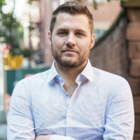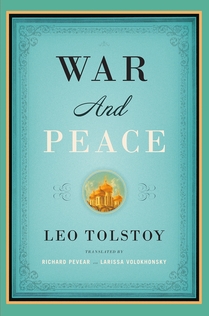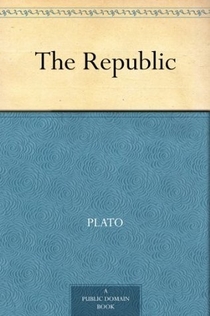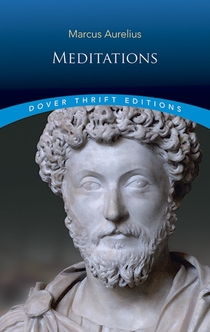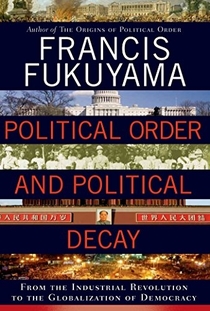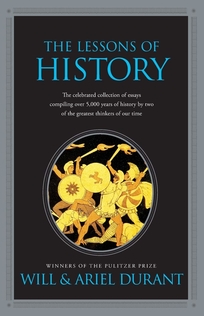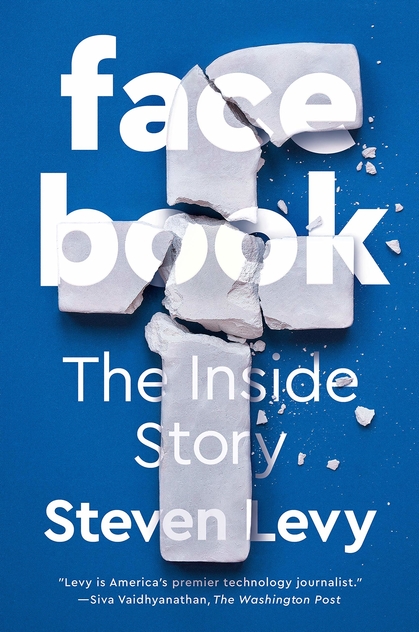
Mark Manson Books - 46 Recommendations for All Time
Mark Manson
Mark Manson recommended books or the all-time favorites. 46 books recommended by Mark Manson.
This is a list of the books he's read and loved so much that he recommends them as the best compilation of books to read ever.
Mark Manson books here are in no particular order and without comments, because he wanted you to do your own research and pick a book that will reward you with an interesting plot and valuable information.
The genres are absolutely different, so you will be able to find something suitable for your taste. Most of the Mark Manson reading list books are bestsellers or highly regarded pieces of work, so it is 100% worth your time.
This booklist is constantly updated, as soon as Mark adds another book to his preferences.
Check out Mark Manson Books - 46 top recommendations!
See all
0
likes
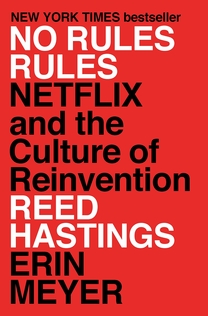
No Rules Rules
*** Shortlisted for the 2020 Financial Times & McKinsey Business Book of the Year ***It's time to do things differently. Trust your team. Be radically honest. And never, ever try to please your boss.These are some of the ground rules if you work at Netflix. They are part of a unique cultural experiment that explains how the company has transformed itself at lightning speed from a DVD mail order service into a streaming superpower - with 190 million fervent subscribers and a market capitalisation that rivals the likes of Disney.Finally Reed Hastings, Netflix Chairman and CEO, is sharing the secrets that have revolutionised the entertainment and tech industries. With INSEAD business school professor Erin Meyer, he will explore his leadership philosophy - which begins by rejecting the accepted beliefs under which most companies operate - and how it plays out in practice at Netflix.From unlimited holidays to abolishing approvals, Netflix offers a fundamentally different way to run any organisation, one far more in tune with an ever-changing fast-paced world. For anyone interested in creativity, productivity and innovation, the Netflix culture is something close to a holy grail. This book will make it, and its creator, fully accessible for the first time.
See all
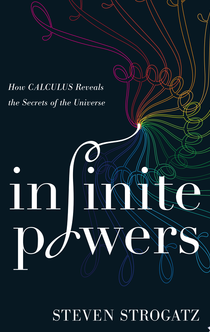
Infinite Powers
From preeminent math personality and author of The Joy of x, a brilliant and endlessly appealing explanation of calculus—how it works and why it makes our lives immeasurably better. Without calculus, we wouldn’t have cell phones, TV, GPS, or ultrasound. We wouldn’t have unraveled DNA or discovered Neptune or figured out how to put 5,000 songs in your pocket.Though many of us were scared away from this essential, engrossing subject in high school and college, Steven Strogatz’s brilliantly creative, down‐to‐earth history shows that calculus is not about complexity; it’s about simplicity. It harnesses an unreal number—infinity—to tackle real‐world problems, breaking them down into easier ones and then reassembling the answers into solutions that feel miraculous.Infinite Powers recounts how calculus tantalized and thrilled its inventors, starting with its first glimmers in ancient Greece and bringing us right up to the discovery of gravitational waves (a phenomenon predicted by calculus). Strogatz reveals how this form of math rose to the challenges of each age: how to determine the area of a circle with only sand and a stick; how to explain why Mars goes “backwards” sometimes; how to make electricity with magnets; how to ensure your rocket doesn’t miss the moon; how to turn the tide in the fight against AIDS.As Strogatz proves, calculus is truly the language of the universe. By unveiling the principles of that language, Infinite Powers makes us marvel at the world anew.
See all
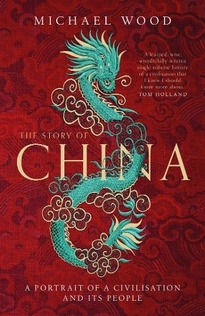
The Story of China
A single volume history of China, offering a look into the past of the global superpower and its significance today.Michael Wood has travelled the length and breadth of China, the world’s oldest civilization and longest lasting state, to tell a thrilling story of intense drama, fabulous creativity, and deep humanity that stretches back thousands of years.After a century and a half of foreign invasion, civil war, and revolution, China has once again returned to center stage as a global superpower and the world’s second largest economy. But how did it become so dominant? Wood argues that in order to comprehend the great significance of China today, we must begin with its history. The Story of China takes a fresh look at the Middle Kingdom in the light of the recent massive changes inside the country. Taking into account exciting new archeological discoveries, the book begins with China’s prehistory—the early dynasties, the origins of the Chinese state, and the roots of Chinese culture in the age of Confucius. Wood looks at particular periods and themes that are now being reevaluated by historians, such as the renaissance of the Song with its brilliant scientific discoveries. He paints a vibrant picture of the Qing Empire in the 18th century, just before the European impact, a time when China’s rich and diverse culture was at its height. Then, Wood explores the encounter with the West, the Opium Wars, the clashes with the British, and the extraordinarily rich debates in the late 19th century that pushed China along the path to modernity.Finally, he provides a clear up-to-date account of post-1949 China, including revelations about the 1989 crisis based on newly leaked inside documents, and fresh insights into the new order of President Xi Jinping. All woven together with landscape history and the author’s own travel journals, The Story of China is the indispensable book about the most intriguing and powerful country on the world stage today.
See all
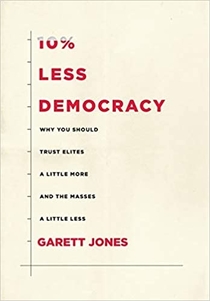
10% Less Democracy
During the 2016 presidential election, both Donald Trump and Bernie Sanders argued that elites were hurting the economy. But, drawing together evidence and theory from across economics, political science, and even finance, Garett Jones says otherwise. In 10% Less Democracy, he makes the case that the richest, most democratic nations would be better off if they slightly reduced accountability to the voting public, turning up the dial on elite influence. To do this, Jones builds on three foundational lines of evidence in areas where he has personal experience. First, as a former staffer in the U.S. Senate, he saw how senators voted differently as elections grew closer. Second, as a macroeconomist, Jones knows the merits of "independent" central banks, which sit apart from the political process and are controlled by powerful insiders. The consensus of the field is that this detached, technocratic approach has worked far better than more political and democratic banking systems. Third, his previous research on the effects of cognitive skills on political, social, and economic systems revealed many ways in which well-informed voters improve government. Discerning repeated patterns, Jones draws out practical suggestions for fine-tuning, focusing on the length of political terms, the independence of government agencies, the weight that voting systems give to the more-educated, and the value of listening more closely to a group of farsighted stakeholders with real skin in the game--a nation's sovereign bondholders. Accessible to political news junkies while firmly rooted and rigorous, 10% Less Democracy will fuel the national conversation about what optimal government looks like.
See all
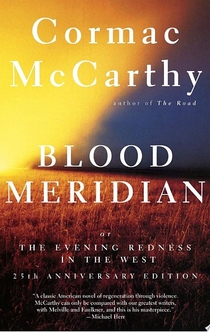
Blood Meridian
"The fulfilled renown of Moby-Dick and of As I Lay Dying is augmented by Blood Meridian, since Cormac McCarthy is the worthy disciple both of Melville and Faulkner," writes esteemed literary scholar Harold Bloom in his Introduction to the Modern Library edition. "I venture that no other living American novelist, not even Pynchon, has given us a book as strong and memorable."Cormac McCarthy's masterwork, Blood Meridian, chronicles the brutal world of the Texas-Mexico borderlands in the mid-nineteenth century. Its wounded hero, the teenage Kid, must confront the extraordinary violence of the Glanton gang, a murderous cadre on an official mission to scalp Indians and sell those scalps. Loosely based on fact, the novel represents a genius vision of the historical West, one so fiercely realized that since its initial publication in 1985 the canon of American literature has welcomed Blood Meridian to its shelf. "A classic American novel of regeneration through violence," declares Michael Herr. "McCarthy can only be compared to our greatest writers."
See all

The Theory That Would Not Die
"This account of how a once reviled theory, Baye’s rule, came to underpin modern life is both approachable and engrossing" (Sunday Times). A New York Times Book Review Editors’ Choice Bayes' rule appears to be a straightforward, one-line theorem: by updating our initial beliefs with objective new information, we get a new and improved belief. To its adherents, it is an elegant statement about learning from experience. To its opponents, it is subjectivity run amok. In the first-ever account of Bayes' rule for general readers, Sharon Bertsch McGrayne explores this controversial theorem and the generations-long human drama surrounding it. McGrayne traces the rule’s discovery by an 18th century amateur mathematician through its development by French scientist Pierre Simon Laplace. She reveals why respected statisticians rendered it professionally taboo for 150 years—while practitioners relied on it to solve crises involving great uncertainty and scanty information, such as Alan Turing's work breaking Germany's Enigma code during World War II. McGrayne also explains how the advent of computer technology in the 1980s proved to be a game-changer. Today, Bayes' rule is used everywhere from DNA de-coding to Homeland Security. Drawing on primary source material and interviews with statisticians and other scientists, The Theory That Would Not Die is the riveting account of how a seemingly simple theorem ignited one of the greatest controversies of all time.
See all

Laughing at Nothing
Explores the concept of nihilism and argues that it need not imply despair, but can be responded to positively.Disputing the common misconception that nihilism is wholly negative and necessarily damaging to the human spirit, John Marmysz offers a clear and complete definition to argue that it is compatible, and indeed preferably responded to, with an attitude of good humor. He carefully scrutinizes the phenomenon of nihilism as it appears in the works, lives, and actions of key figures in the history of philosophy, literature, politics, and theology, including Nietzsche, Heidegger, Camus, and Mishima. While suggesting that there ultimately is no solution to the problem of nihilism, Marmysz proposes a way of utilizing the anxiety and despair that is associated with the problem as a spur toward liveliness, activity, and the celebration of life.John Marmysz teaches Philosophy at Corning Community College.
See all
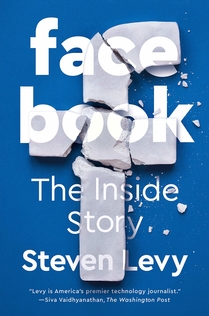
One of the Best Technology Books of 2020—Financial Times“Levy’s all-access Facebook reflects the reputational swan dive of its subject. . . . The result is evenhanded and devastating.”—San Francisco Chronicle “[Levy’s] evenhanded conclusions are still damning.”—Reason “[He] doesn’t shy from asking the tough questions.”—The Washington Post “Reminds you the HBO show Silicon Valley did not have to reach far for its satire.”—NPR.org The definitive history, packed with untold stories, of one of America’s most controversial and powerful companies: Facebook As a college sophomore, Mark Zuckerberg created a simple website to serve as a campus social network. Today, Facebook is nearly unrecognizable from its first, modest iteration. In light of recent controversies surrounding election-influencing “fake news” accounts, the handling of its users’ personal data, and growing discontent with the actions of its founder and CEO—who has enormous power over what the world sees and says—never has a company been more central to the national conversation. Millions of words have been written about Facebook, but no one has told the complete story, documenting its ascendancy and missteps. There is no denying the power and omnipresence of Facebook in American daily life, or the imperative of this book to document the unchecked power and shocking techniques of the company, from growing at all costs to outmaneuvering its biggest rivals to acquire WhatsApp and Instagram, to developing a platform so addictive even some of its own are now beginning to realize its dangers. Based on hundreds of interviews from inside and outside Facebook, Levy’s sweeping narrative of incredible entrepreneurial success and failure digs deep into the whole story of the company that has changed the world and reaped the consequences.
See all

Ernest Hemingway's The Old Man and the Sea
Hemingway's last work published during his lifetime remains one of his most popular and best known. A man's symbolic quest to land the catch of a lifetime engages classic themes of the human struggle against nature as well as explores the intersection of expectation and desire. Filled with fresh essays about the book, the new edition of this invaluable literary guide features a bibliography and notes on the essay contributors, as well as an introductory essay by master scholar Harold Bloom.
See all

This Life
Winner of the René Wellek PrizeNamed a Best Book of the Year by The Guardian, The Millions, and The Sydney Morning HeraldA profound, original, and accessible book that offers a new secular vision of how we can lead our lives. Ranging from fundamental existential questions to the most pressing social issues of our time, This Life shows why our commitment to freedom and democracy should lead us beyond both religion and capitalism.In this groundbreaking book, the philosopher Martin Hägglund challenges our received notions of faith and freedom. The faith we need to cultivate, he argues, is not a religious faith in eternity but a secular faith devoted to our finite life together. He shows that all spiritual questions of freedom are inseparable from economic and material conditions. What ultimately matters is how we treat one another in this life, and what we do with our time together. Hägglund develops new existential and political principles while transforming our understanding of spiritual life. His critique of religion takes us to the heart of what it means to mourn our loved ones, be committed, and care about a sustainable world. His critique of capitalism demonstrates that we fail to sustain our democratic values because our lives depend on wage labor. In clear and pathbreaking terms, Hägglund explains why capitalism is inimical to our freedom, and why we should instead pursue a novel form of democratic socialism. In developing his vision of an emancipated secular life, Hägglund engages with great philosophers from Aristotle to Hegel and Marx, literary writers from Dante to Proust and Knausgaard, political economists from Mill to Keynes and Hayek, and religious thinkers from Augustine to Kierkegaard and Martin Luther King, Jr. This Life gives us new access to our past—for the sake of a different future.
See all

Fundamental Principles of the Metaphysics of Morals
What is morally permissible, and what is morally obligatory? These questions form the core of a vast amount of philosophical reasoning. In his Fundamental Principles of the Metaphysics of Morals, Immanuel Kant developed a basis for the answers.In this landmark work, the German philosopher asks what sort of maxim might function as a guide to appropriate action under a given set of circumstances. By universalizing such a maxim, would morally permissible behavior not become clear? Suppose that everyone were to behave in accordance with this maxim. If everyone followed the maxim in the same way without harm to civilized culture, then the behavior would be morally permissible. But what if no one followed the maxim? Would civilization thereby be at risk? In such a case, the behavior would be morally obligatory.Kant's test, known as the Categorical Imperative, is a logical proof of the Golden Rule and the centerpiece of this work. It constitutes his best-known contribution to ethical discussion, and a familiarity with his reasoning in this book is essential to students of philosophy, religion, and history.
See all
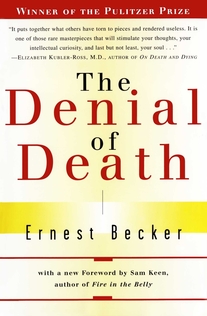
The Denial of Death
Winner of the Pulitzer Prize in 1974 and the culmination of a life's work, The Denial of Death is Ernest Becker's brilliant and impassioned answer to the 'why' of human existence. In bold contrast to the predominant Freudian school of thought, Becker tackles the problem of the vital lie - man's refusal to acknowledge his own mortality. The book argues that human civilisation is a defence against the knowledge that we are mortal beings. Becker states that humans live in both the physical world and a symbolic world of meaning, which is where our 'immortality project' resides. We create in order to become immortal - to become part of something we believe will last forever. In this way we hope to give our lives meaning.In The Denial of Death, Becker sheds new light on the nature of humanity and issues a call to life and its living that still resonates decades after it was written.
See all
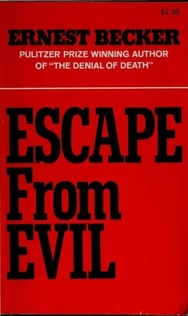
Escape from Evil
From the Pulitzer Prize-winning author of The Denial of Death, a penetrating and insightful perspective on the source of evil in our world.“A profound, nourishing book…absolutely essential to the understanding of our troubled times.” —Anais Nin“An urgent essay that bears all the marks of a final philosophical raging against the dying of the light.” —Newsweek“Brilliant and challenging…adds another bit of reason to balance destruction…It is, in the best sense of the words, both scientific and philosophical…of the highest importance.” —Los Angeles Times
See all
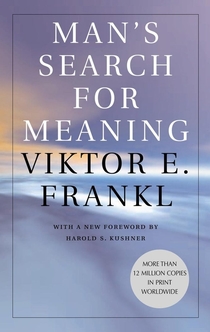
Man's Search for Meaning
Psychiatrist Viktor Frankl's memoir has riveted generations of readers with its descriptions of life in Nazi death camps and its lessons for spiritual survival. Between 1942 and 1945 Frankl labored in four different camps, including Auschwitz, while his parents, brother, and pregnant wife perished. Based on his own experience and the experiences of those he treated in his practice, Frankl argues that we cannot avoid suffering but we can choose how to cope with it, find meaning in it, and move forward with renewed purpose. Frankl's theory—known as logotherapy, from the Greek word logos ("meaning")—holds that our primary drive in life is not pleasure, as Freud maintained, but the discovery and pursuit of what we personally find meaningful.At the time of Frankl's death in 1997, Man's Search for Meaning had sold more than 10 million copies in twenty-four languages. A 1991 reader survey by the Library of Congress and the Book-of-the-Month Club that asked readers to name a "book that made a difference in your life" found Man's Search for Meaning among the ten most influential books in America. Born in Vienna in 1905 Viktor E. Frankl earned an M.D. and a Ph.D. from the University of Vienna. He published more than thirty books on theoretical and clinical psychology and served as a visiting professor and lecturer at Harvard, Stanford, and elsewhere. In 1977 a fellow survivor, Joseph Fabry, founded the Viktor Frankl Institute of Logotherapy. Frankl died in 1997. Harold S. Kushner is rabbi emeritus at Temple Israel in Natick, Massachusetts, and the author of several best-selling books, including When Bad Things Happen to Good People.William J. Winslade is a philosopher, lawyer, and psychoanalyst at the University of Texas Medical School in Galveston.
See all

Thinking in Bets
Wall Street Journal bestseller! Poker champion turned business consultant Annie Duke teaches you how to get comfortable with uncertainty and make better decisions as a result.In Super Bowl XLIX, Seahawks coach Pete Carroll made one of the most controversial calls in football history: With 26 seconds remaining, and trailing by four at the Patriots' one-yard line, he called for a pass instead of a hand off to his star running back. The pass was intercepted and the Seahawks lost. Critics called it the dumbest play in history. But was the call really that bad? Or did Carroll actually make a great move that was ruined by bad luck?Even the best decision doesn't yield the best outcome every time. There's always an element of luck that you can't control, and there is always information that is hidden from view. So the key to long-term success (and avoiding worrying yourself to death) is to think in bets: How sure am I? What are the possible ways things could turn out? What decision has the highest odds of success? Did I land in the unlucky 10% on the strategy that works 90% of the time? Or is my success attributable to dumb luck rather than great decision making? Annie Duke, a former World Series of Poker champion turned business consultant, draws on examples from business, sports, politics, and (of course) poker to share tools anyone can use to embrace uncertainty and make better decisions. For most people, it's difficult to say "I'm not sure" in a world that values and, even, rewards the appearance of certainty. But professional poker players are comfortable with the fact that great decisions don't always lead to great outcomes and bad decisions don't always lead to bad outcomes.By shifting your thinking from a need for certainty to a goal of accurately assessing what you know and what you don't, you'll be less vulnerable to reactive emotions, knee-jerk biases, and destructive habits in your decision making. You'll become more confident, calm, compassionate and successful in the long run.
See all

Antifragile
Antifragile is a standalone book in Nassim Nicholas Taleb’s landmark Incerto series, an investigation of opacity, luck, uncertainty, probability, human error, risk, and decision-making in a world we don’t understand. The other books in the series are Fooled by Randomness, The Black Swan, Skin in the Game, and The Bed of Procrustes.Nassim Nicholas Taleb, the bestselling author of The Black Swan and one of the foremost thinkers of our time, reveals how to thrive in an uncertain world. Just as human bones get stronger when subjected to stress and tension, and rumors or riots intensify when someone tries to repress them, many things in life benefit from stress, disorder, volatility, and turmoil. What Taleb has identified and calls “antifragile” is that category of things that not only gain from chaos but need it in order to survive and flourish. In The Black Swan, Taleb showed us that highly improbable and unpredictable events underlie almost everything about our world. In Antifragile, Taleb stands uncertainty on its head, making it desirable, even necessary, and proposes that things be built in an antifragile manner. The antifragile is beyond the resilient or robust. The resilient resists shocks and stays the same; the antifragile gets better and better. Furthermore, the antifragile is immune to prediction errors and protected from adverse events. Why is the city-state better than the nation-state, why is debt bad for you, and why is what we call “efficient” not efficient at all? Why do government responses and social policies protect the strong and hurt the weak? Why should you write your resignation letter before even starting on the job? How did the sinking of the Titanic save lives? The book spans innovation by trial and error, life decisions, politics, urban planning, war, personal finance, economic systems, and medicine. And throughout, in addition to the street wisdom of Fat Tony of Brooklyn, the voices and recipes of ancient wisdom, from Roman, Greek, Semitic, and medieval sources, are loud and clear. Antifragile is a blueprint for living in a Black Swan world. Erudite, witty, and iconoclastic, Taleb’s message is revolutionary: The antifragile, and only the antifragile, will make it.Praise for Antifragile“Ambitious and thought-provoking . . . highly entertaining.”—The Economist “A bold book explaining how and why we should embrace uncertainty, randomness, and error . . . It may just change our lives.”—Newsweek
See all

The Black Swan
In the author's point of view, a black swan is an improbable event with three principal characteristics - It is unpredictable; it carries a massive impact; and, after the fact, we concoct an explanation that makes it appear less random, and more predictable, than it was. Why do we not acknowledge the phenomenon of black swans until after they occur? Part of the answer, according to Taleb, is that humans are hardwired to learn specifics when they should be focused on generalities. We concentrate on things we already know and time and time again fail to take into consideration what we don't know. We are, therefore, unable to truly estimate opportunities, too vulnerable to the impulse to simplify, narrate, and categorize, and not open enough to rewarding those who can imagine the 'impossible'.
See all

Fooled by Randomness
Fooled by Randomness is a standalone book in Nassim Nicholas Taleb’s landmark Incerto series, an investigation of opacity, luck, uncertainty, probability, human error, risk, and decision-making in a world we don’t understand. The other books in the series are The Black Swan, Antifragile, Skin in the Game, and The Bed of Procrustes.Fooled by Randomness is the word-of-mouth sensation that will change the way you think about business and the world. Nassim Nicholas Taleb–veteran trader, renowned risk expert, polymathic scholar, erudite raconteur, and New York Times bestselling author of The Black Swan–has written a modern classic that turns on its head what we believe about luck and skill. This book is about luck–or more precisely, about how we perceive and deal with luck in life and business. Set against the backdrop of the most conspicuous forum in which luck is mistaken for skill–the world of trading–Fooled by Randomness provides captivating insight into one of the least understood factors in all our lives. Writing in an entertaining narrative style, the author tackles major intellectual issues related to the underestimation of the influence of happenstance on our lives. The book is populated with an array of characters, some of whom have grasped, in their own way, the significance of chance: the baseball legend Yogi Berra; the philosopher of knowledge Karl Popper; the ancient world’s wisest man, Solon; the modern financier George Soros; and the Greek voyager Odysseus. We also meet the fictional Nero, who seems to understand the role of randomness in his professional life but falls victim to his own superstitious foolishness. However, the most recognizable character of all remains unnamed–the lucky fool who happens to be in the right place at the right time–he embodies the “survival of the least fit.” Such individuals attract devoted followers who believe in their guru’s insights and methods. But no one can replicate what is obtained by chance. Are we capable of distinguishing the fortunate charlatan from the genuine visionary? Must we always try to uncover nonexistent messages in random events? It may be impossible to guard ourselves against the vagaries of the goddess Fortuna, but after reading Fooled by Randomness we can be a little better prepared. Named by Fortune One of the Smartest Books of All Time A Financial Times Best Business Book of the Year
See all

The Origins of Political Order
A New York Times Notable Book for 2011 A Globe and Mail Best Books of the Year 2011 TitleA Kirkus Reviews Best Nonfiction of 2011 title Virtually all human societies were once organized tribally, yet over time most developed new political institutions which included a central state that could keep the peace and uniform laws that applied to all citizens. Some went on to create governments that were accountable to their constituents. We take these institutions for granted, but they are absent or are unable to perform in many of today's developing countries—with often disastrous consequences for the rest of the world.Francis Fukuyama, author of the bestselling The End of History and the Last Man and one of our most important political thinkers, provides a sweeping account of how today's basic political institutions developed. The first of a major two-volume work, The Origins of Political Order begins with politics among our primate ancestors and follows the story through the emergence of tribal societies, the growth of the first modern state in China, the beginning of the rule of law in India and the Middle East, and the development of political accountability in Europe up until the eve of the French Revolution.Drawing on a vast body of knowledge—history, evolutionary biology, archaeology, and economics—Fukuyama has produced a brilliant, provocative work that offers fresh insights on the origins of democratic societies and raises essential questions about the nature of politics and its discontents.
See all
